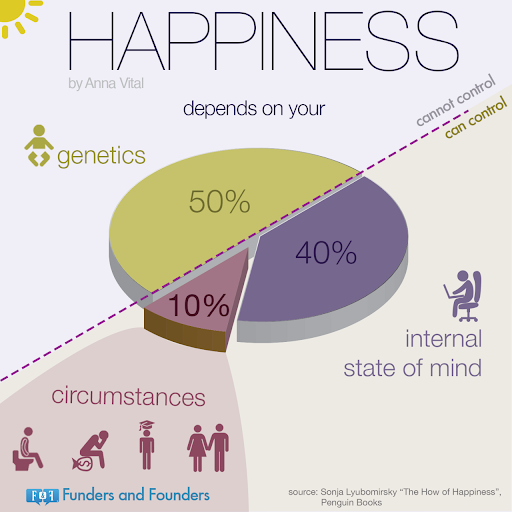Fundamentals of Well-Being
Happiness means something different to everyone, but there are some key factors that can play a big role in determining your overall well-being. 40% of your well-being is determined by your internal state of mind. The rest is controlled by genetics and life circumstances. This means a big part of what makes us happy is under our control.

Flexible Thinking
You have a lot of influence over your skills and abilities through your mindset. When it comes to how we view our abilities and the way we react to challenging situations, people have either a fixed or growth mindset.
A Fixed mindset means you see ability and understanding as being fixed. You either “have it or you don’t.” A growth mindset is understanding that you can develop skills and abilities by putting in time and effort. You believe that there is room to change and grow to become smarter or more talented.
Your mindset affects how you face and cope with challenging situations. With a growth mindset, you’re more likely to keep working hard, despite setbacks, because these challenges provide a chance to learn and do better in the future.
Having a growth mindset is something you can practice and get better at. Complete the Personal Model of Resilience to practice cultivating a growth mindset.
Strategies for Boosting Well-Being
Knowing that we can boost our well-being is a huge step towards doing so. There are several behaviours that you can start slowly incorporating into your life that help with creating long-term happiness.
Mindfulness is being simply present at this very moment. Being mindful keeps us grounded in the actual situation and realistically focuses on solutions and actions that will make a difference.
- Take a breath, meditate, or take the time to reset to be in the present moment.
Gratitude goes beyond simply saying thank you when someone does you a favour. It’s about noticing good things that are happening around you, taking it in, savouring or really enjoying experiences, the kindness of others, and the opportunities you have.
- Keep a journal or write letters where you take note of the good things you notice around you no matter how small.
Optimism is the way we explain why good things happen to us and why bad things happen to us and it significantly affects our well-being. Seeing your role in the good and letting go of the bad will help you develop skills to feel optimistic about the future.
- It’s hard to get movement from pessimism. Remind yourself that you did the best you could and that you’ve played an active role in making good things happen in your life.
Self-compassion. What if, instead of being self-critical, you were your own best friend? Kind, supportive, patient, and loving in the moment you need it the most. Cultivating this attitude of being your own best friend is key to well-being.
- Think about if you would talk to your best friend the way you sometimes talk to yourself. Notice how mean you can be to yourself, especially in the moments when you need kindness the most. You can’t be perfect so be forgiving with yourself.
Grit is perseverance and passion for long term goals. Grit can help you overcome setbacks, challenges, losses, hurdles.
- Remember that changing your mental mindset is a marathon. It won’t happen overnight, but by remembering that you can bounce back when things go wrong, you’ll get there!
Overall, these five factors all help you change how you think which can change how you feel!
Thriving in Your Own Life
Mindfulness, gratitude, optimism, self-compassion, and grit are all ways to take your well-being into your own hands. However, what this looks like for you will be different from everyone else because these practices need to actually fit into your life. This can take a couple different routes.
Consider Your Needs
What’s missing? You may be more pessimistic and might benefit from cultivating optimism. Perhaps you need to take time to savour the small things. If you’re satisfied with your relationships, but not with school, it could be good to strive for a goal. If you’re busy, choose quick and easy practices to try.
Consider Your Strengths
Start by identifying your strengths and talents. If you’re creative, you might express gratitude for writing or painting. If you’re achievement oriented, joining a competitive intramural team could boost your vitality. Learn more about character strengths here.